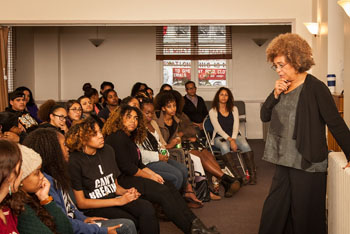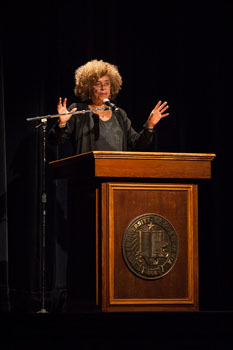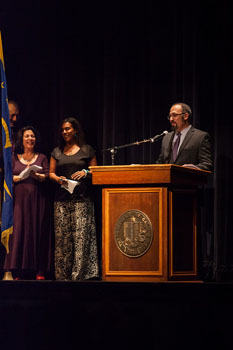Campus News
Angela Davis addresses ‘police militarization’ at capacity MLK Convocation
Angela Davis addressed a capacity crowd about social justice, police militarization and brutality during the 31st annual Martin Luther King Jr. Convocation in downtown Santa Cruz



Activist, author, and UC Santa Cruz professor emerita Angela Davis drew one of the largest crowds in the three-decade-long history of the Martin Luther King Jr. Memorial Convocation, packing the 1,800-capacity Santa Cruz Civic Auditorium while a crowd of hundreds stood outside the doors and down the block hoping to get in.
The last time a convocation drew a comparable response was in 2002 when Alice Walker, author of the bestselling 1982 novel The Color Purple delivered the keynote.
Davis described her speech as a way of reflecting on Martin Luther King’s place in history and carrying his ideas into the present day. She referred in particular to King’s “beyond Vietnam” speech delivered a year before his assassination, and quoted at length from his famous address: “I am convinced that if we are to get on the right side of the world revolution, we … must rapidly begin the shift from a thing-oriented society to a person-oriented society. When machines and computers, profit motives and property rights, are considered more important than people, the giant triplets of racism, extreme materialism, and militarism are incapable of being conquered.”
During her 50-minute talk, Davis tied “police militarization” in America to the shootings of unarmed black citizens—and she provided a long, grim list of recent examples to back up her point. In her lecture, “Racism, Militarism, and Poverty: From Ferguson to Palestine,” she drew comparisons between police militarization and brutality in the United States and Israel’s military presence in the Palestinian territories.
“Palestinian activists were identifying with our struggles with racist violence” after the killing of Michael Brown, an unarmed black teenager shot by a white police officer last summer in Ferguson, Missouri, she said. “It was Palestinian activists who noticed not only the militarization of the Ferguson police but the similarities of some of the weapons used in Ferguson with some of the weapons used in occupied Palestine,” she remarked.
Davis said she witnessed impassioned responses to the killing during her recent travels overseas, “especially after young people began to mobilize and let it be known that that they would not sit quietly by while young people were struck down by the police. In Brussels, Belgium, people wanted to hear about the struggles against racist police violence, and even though they didn’t speak English, they were saying, ‘Hands up, don’t shoot.’”
Reiterating King’s grave concerns about the “triumvirate of racism, militarism, and poverty,” Davis called for broad systemic changes. “If we want an end to anti-black and anti-Latino racism we will also have to speak out against economic exploitation, against war, against the destruction of the environment, against anti-Muslimism and anti-Semitism, against gender bias and homophobia, and of course for access to good organic non-GMO food, for free health care and free education for all.’”
By the end of the evening she’d also called for the total disarmament of everyone in America including the police.
While many people inside the auditorium were highly enthusiastic and cheered many of her main talking points, the event also drew controversy; 22 Jewish UC Santa Cruz alumni expressed their anger about the selection of Angela Davis as the convocation speaker and called her topic choice inflammatory in an open letter. UC Santa Cruz Chancellor George Blumenthal responded to concerns earlier in the week with a statement about the importance of constructive debate and the free exchange of ideas.
Davis was the latest in a long list of high-profile speakers who has addressed the crowd at the convention. Others include Yolanda King, activist, actress, and daughter of Martin Luther King Jr.; the actress and activist Cicely Tyson; Harvard University professor Cornel West; author and social activist bell hooks; and poet, commentator, activist, and professor Nikki Giovanni.
Santa Cruz Mayor Don Lane was on hand to give Angela Davis “the key to the city” of Santa Cruz. He told Davis that his daughter was a great fan of hers.
The evening was also a chance to honor Jacob Martinez, this year’s honoree of the Tony Hill Memorial Award, given to a Santa Cruz–area community member who embodies the bridge building, mediation, and community activism of Tony Hill, who died of a heart attack in 2007.
Martinez (Oakes ’04, ecology and evolutionary biology) is a strong advocate for low-income Latino and Latina youth who are interested in science, math, and technological careers but face obstacles along the way. He is the second UC Santa Cruz alumnus to receive this high honor; the first was Deutron Kebebew (Kresge ’03, electrical engineering), former foster child and a hardworking advocate for teens and children.